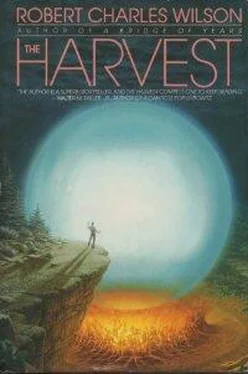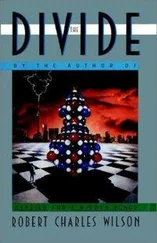Colonel Tyler, by his own testimony, had left the military almost fifteen years ago. It wasn’t force of habit that had put him in charge tonight. It was careful planning, Matt thought, and a couple of partisan malcontents: Paul Jacopetti and Joey Commoner.
And something else. Matt sensed in the Colonel a certain restlessness, an impatience that always seemed about to break out into violence. Catch him in a quiet moment and you’d find Tyler tapping his foot to some inner rhythm, his eyes fixed and absent and his big hands closed into fists.
But he couldn’t say this to Beth without sounding paranoid or petty. Anyway, her vote hadn’t mattered any more than Chuck Makepeace’s vote, or Bob Ganish’s. It was only bad timing that made it seem that way.
She had done what she thought was the right thing, and in the end maybe her call was as good as his.
She said, “I guess I should leave.”
“Only if you want to.”
Tentatively: “You’re not angry?”
“No.” He realized he wasn’t.
She sat beside him. Relieved, weary, she put her head against him.
He stroked her long hair and listened to the night wind tugging at the corners of the RV. He would never get used to these inland plains. He missed the sea.
He thought about Beth—all the aspects of Beth Porter. The neglected, sullen Beth: the Beth who had tattooed WORTHLESS on her shoulder, who had baited Joey Commoner until Joey felt compelled to pull a knife.
And this other Beth. Beth treating Jacopem’s anxiety with the anodyne of her own calm. Beth studying anatomy textbooks with the dedication of a monk.
Something clean and strong rising out of all the garbage in her life. “Joey’s standing watch,” she said. “He has a campfire on the highway facing west.”
“Did he see you come?”
“No. Anyway, I’m tired of worrying about Joey. He’s acting like an asshole.”
“Maybe a dangerous one.”
“Joey and his pocketknife? I doubt it.”
“After what you said that night…”
“I shouldn’t have. I know. But he doesn’t own me. He never did.”
“We’re a fragile community. I don’t want to create one more problem.”
“Then should I leave?” Challenging him. “Beth—you know you don’t have to.”
“I want to stay a while longer.”
“Then stay.”
A cold night. A little warmth.
The caravan of ten dusty RVs and trailers, led by Colonel Tyler in a four-wheel-drive Ford pickup, turned south on Interstate 84 toward Utah.
Tyler drove with the windows rolled down, admitting a breeze so dry it made his lips bleed. He drove at a cautious, steady pace. Sometimes he felt fettered by the train of ponderous vehicles behind him. But it was a privilege, he thought, to blaze the trail. To see the way ahead.
The highway seemed wider for being empty. Periodically he passed an abandoned truck or car, and it was nice to know that in an emergency the Committee could siphon gas from one of these. But no emergency arose. Most of the roadside gas stations had functional pumps, and Joey Commoner and Bob Ganish had been scrupulous about keeping the convoy’s engines in decent repair.
Tyler led them across the Great Basin into Utah, joined what had once been a populous stretch of 1-15 north of Brigham City, then veered east on 1-80 where the towns grew sparse again.
Tyler read the road maps with great care. He was worried about crossing the Rockies. 1-80 skirted much of the mountains, followed the Union Pacific route through the Red Desert in Wyoming, but late or early storms had been known to strand unwary travellers.
He called a halt at a town named Emory and pressed on in the morning. The sky when he started his engine was bright with herringbone clouds.
The road climbed and subsided and began to climb again.
He felt better when the road wound away from civilization. Those empty towns were oppressive. Mountain and desert were simply eternal. Granite and sagebrush and cheat grass: invulnerable to all the discord that had dropped like bad magic out of a starry sky.
He was alone in the cab of the pickup truck, although Sissy kept him company.
* * *
Sissy had been keeping him sporadic company since that town in Georgia—Loftus.
She spoke to him, a voice out of the wind, but he didn’t actually see her until one afternoon in rural Texas while he was driving the Hummer west. It seemed appropriate that Sissy should appear in the desert. The desert was a place of mirages, dust-devils, chromium-blue lakes shimmering where the highway touched the horizon. Sissy had seemed exactly that tenuous, sitting next to him where A.W. Murdoch used to be. She was a translucent, desert-dry Sissy—dressed as inappropriately as ever in cotton and nylon and polyester of all colors, clothes so brittle with old dirt that any motion emitted a greasy rustle and exuded an odor too stale to be offensive. It was the smell, Tyler thought, of something dead that had dried a long time in the sunlight.
The radio was good, Sissy told him, good to be talking to those people, smart, but be careful, she said: stay away from the crowds, all those East Coast city survivors, clever and dangerous in some way she never explained. Talk to that Joseph, Sissy said. He admires you.
Sissy was an illusion. Tyler knew that. Of course he did. You’d have to be crazy to believe she was really sitting there, some kind of ghost.
She was, as the psychologists would no doubt say, a private revenant, a fragment of himself. She was Tyler giving Tyler Tyler’s advice.
But in another way she really was Sissy: Sissy cut loose from memory. His memory had lost its grip on Sissy the way a child might lose its grip on a balloon; and like a balloon she had risen up, had floated out of his head and come to rest in the passenger seat beside him.
Sissy advised him to drive to Oregon, hike down from the coastal mountains to Buchanan, assume a leadership position among these ragged refugees.
Lead them east, Sissy said.
To the gathering place of the survivors, a new home in the valley of the Ohio River, a sheltered place—or so Tyler told them, and it had even seemed true for a while.
But Sissy—always a repository of unpleasant surprises—had been coy about their destination.
Tyler led his caravan up a road walled with granite, threading a path around fallen rock. Whenever he turned his head to the right he found Sissy gazing at him. Today she was bright as the sun, her plump cheeks a blazing white, difficult to look at.
Those people back east, Sissy said. They surrounded themselves with Helpers. They talk to Helpers.
“True,” Tyler said.
Helpers are the voice of that thing in the sky… “ I know,” Tyler said, weary of these cryptic pronouncements. Sissy’s eyes, volatile and relentless, demanded answers he was helpless to produce… and of the dead. “ Dead what?” The skinless living.
The Contactees, Tyler interpreted. Contactees who had died might be able to speak through the Helpers. The dead might talk to the living. Tyler said, “The danger…”
They’ll talk about you, John. That girl you killed in Loftus. Maybe it will be Murdoch talking. Maybe Murdoch crossed over, too. And who else might talk? They might talk about Stuttgart. They might remember every sin you ever committed.
This was a new and unwelcome idea.
People will know what you are.
Peevishly: “I’m no worse than the rest.”
They’ll know about Loftus. They’ll call you killer.
Would they? Extraordinary circumstances, Tyler thought. Alien possession. The girl had been… not human.
Читать дальше












